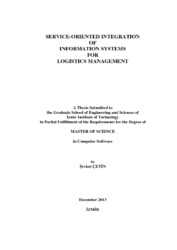Please use this identifier to cite or link to this item:
https://hdl.handle.net/11147/3684Full metadata record
| DC Field | Value | Language |
|---|---|---|
| dc.contributor.advisor | Ayav, Tolga | en |
| dc.contributor.author | Çetin, Şevket | - |
| dc.date.accessioned | 2014-07-22T13:52:09Z | - |
| dc.date.available | 2014-07-22T13:52:09Z | - |
| dc.date.issued | 2013 | en |
| dc.identifier.uri | http://hdl.handle.net/11147/3684 | - |
| dc.description | Thesis (Master)--Izmir Institute of Technology, Computer Engineering, Izmir, 2013 | en |
| dc.description | Includes bibliographical references(leaves: 61-63) | en |
| dc.description | Text in English; Abstract: Turkish an English | en |
| dc.description | x, 74 leaves | en |
| dc.description | Full text release delayed at author's request until 2015.12.14 | en |
| dc.description.abstract | Developments in information technology have become more crucial for corporate firms and businesses. They make use of this technology to manage business processes and it is one of the most invested domains by corporations. As technical infrastructures of companies improve, the number of enterprise-oriented and special software developed for business processes increase, too. With the augmentation of cooperation between companies and incorporated business processes, in time, a need for integration emerges for the applications running in diverse infrastructures and technologies. Logistics business processes are a part of a business domain where there are multiple areas of study such as railway, seaway, road transportation and depot, and where multiple companies and a high number of customer needs are managed. Integrations between companies should be quick, reliable, easily-adaptable to changing business processes is a crucial requirement. As integrations play a significant role in the management of process, the correct establishment of the integration architecture, convenience for follow-ups and management are critical for the flow of business processes related to the monitoring of the possible problems. The main point of this thesis is based on a need for a software infrastructure that will enable integrations to work together. Thus, by getting integrations to utilize service-based architecture, to react quickly to changing business processes and customer needs, it is aimed to provide management and for exception monitoring. That’s why I focused on integration of service-based information systems for logistics management in my thesis. | en |
| dc.language.iso | en | en_US |
| dc.publisher | Izmir Institute of Technology | - |
| dc.rights | info:eu-repo/semantics/openAccess | en_US |
| dc.subject.lcsh | Computer software | en |
| dc.subject.lcsh | Logistics--Computer programs | en |
| dc.title | Service-oriented integration of information systemsfor logistics management | en_US |
| dc.type | Master Thesis | en_US |
| dc.institutionauthor | Çetin, Şevket | - |
| dc.department | Thesis (Master)--İzmir Institute of Technology, Computer Engineering | en_US |
| dc.relation.publicationcategory | Tez | en_US |
| item.languageiso639-1 | en | - |
| item.fulltext | With Fulltext | - |
| item.openairecristype | http://purl.org/coar/resource_type/c_18cf | - |
| item.openairetype | Master Thesis | - |
| item.grantfulltext | open | - |
| item.cerifentitytype | Publications | - |
| Appears in Collections: | Master Degree / Yüksek Lisans Tezleri | |
Files in This Item:
| File | Description | Size | Format | |
|---|---|---|---|---|
| 10020753.pdf | MasterThesis | 3.21 MB | Adobe PDF |  View/Open |
CORE Recommender
Page view(s)
128
checked on Jul 22, 2024
Download(s)
84
checked on Jul 22, 2024
Google ScholarTM
Check
Items in GCRIS Repository are protected by copyright, with all rights reserved, unless otherwise indicated.